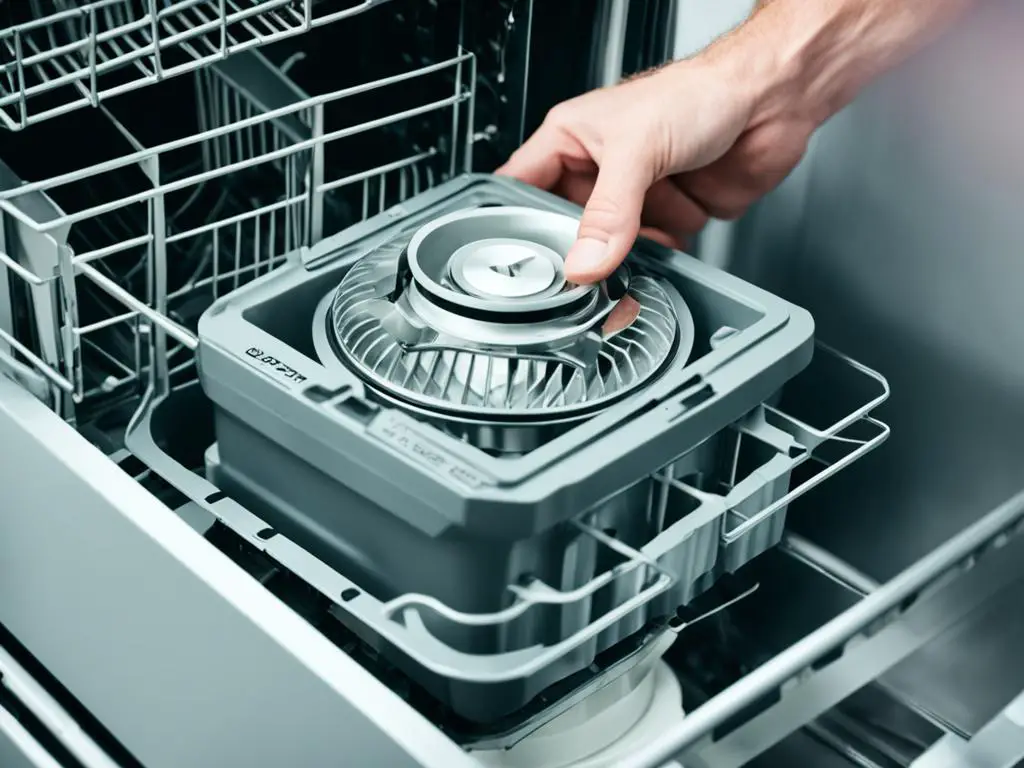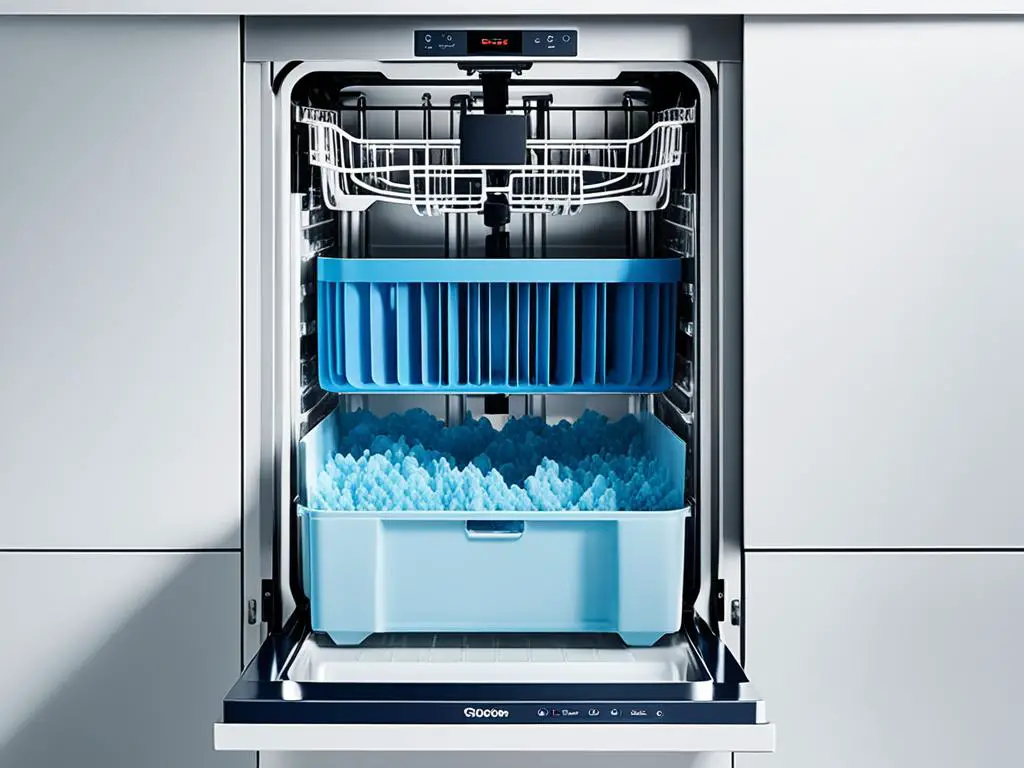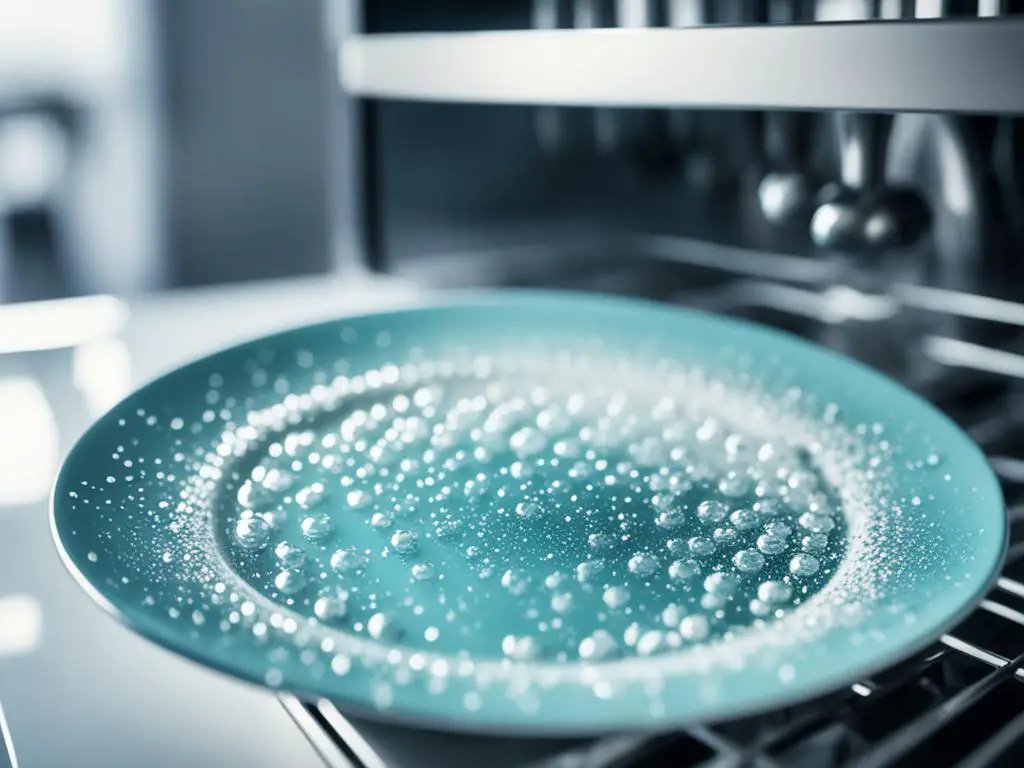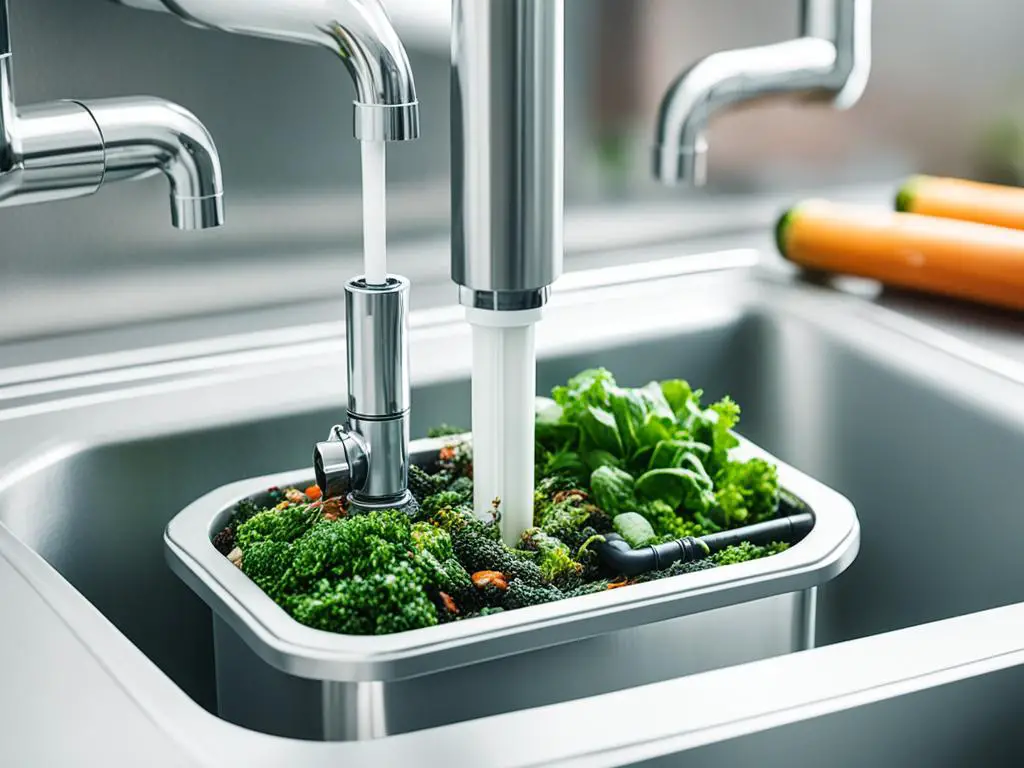When choosing a dishwasher, many buyers focus on the obvious features like third racks and quiet operation. However, one important consideration is the difference between a hard food disposer and a filtration system. While both serve the purpose of removing food particles from the dishwasher, they use different methods to do so. Understanding the pros and cons of each system is crucial for optimal dishwasher performance and efficient kitchen waste management.
Key Takeaways:
- A hard food disposer and a filtration system are two different methods for removing food particles from dishwashers.
- A hard food disposer pulverizes food particles, preventing clogs and ensuring spotless performance.
- A filtration system collects food particles in a basin and rinses them out through the pipes.
- Disposer dishwashers are maintenance-free and prevent residual odors, while filter dishwashers are more cost-effective.
- Following the manufacturer’s recommendations and using rinse aid can help achieve optimal dishwasher performance.
How a Dishwasher Food Disposer Works
A dishwasher with a hard food disposer functions similarly to a sink’s garbage disposal. It pulverizes food particles and clears them from the water before recirculating it for the wash cycle. This system eliminates the need for manual cleaning of the filter and prevents clogs, ensuring spotless dishwasher performance. Additionally, it keeps the spray arms and water pipes free of debris, contributing to the longevity and effective operation of the dishwasher.

“A dishwasher with a hard food disposer functions similarly to a sink’s garbage disposal.”
With a hard food disposer, you can enjoy a maintenance-free dishwasher that delivers spotless performance. Instead of worrying about cleaning and replacing filters regularly, this innovative system takes care of the food particles for you. By pulverizing the food waste and preventing it from reentering the wash cycle, the hard food disposer ensures that your dishes come out spotlessly clean.
Another advantage of a hard food disposer is its ability to prevent clogging. By eliminating the need for manual cleaning of the filter, this system keeps your dishwasher running smoothly. The debris-free spray arms and water pipes ensure optimal water flow and efficient cleaning, contributing to the longevity of your dishwasher.
In conclusion, a dishwasher with a hard food disposer offers maintenance-free convenience, spotless performance, and effective prevention of clogging. By investing in this advanced technology, you can enjoy hassle-free dishwashing and have confidence in the cleanliness of your dishes.
How a Dishwasher Filtration System Works
In contrast to a hard food disposer, a dishwasher filtration system operates by collecting food particles in a basin located at the bottom of the dishwasher tub. This filtration system effectively captures and contains the food debris, preventing it from circulating back onto your dishes during the wash cycle. One of the key components of this system is the ultra-mesh filter, which is designed to emulsify food particles into tiny fragments, enhancing the filtration process by breaking down the particles into smaller, more manageable pieces.
Once the food particles have been emulsified, they are easily rinsed out through the kitchen pipes, ensuring that the wash water remains clean and free from any residual food waste. This filtration system is particularly beneficial for households that have minimal access to a garbage disposal unit or prefer not to install one, as it effectively removes food particles without the need for additional disposal systems.
While basic filtration systems may require manual cleaning every 2-4 weeks to prevent any potential debris buildup, they remain a cost-effective option for individuals on a budget. Regular cleaning of the filter ensures optimal performance and prevents clogging, allowing the dishwasher to continue operating efficiently and effectively.
“The dishwasher filtration system effectively captures and contains food debris, preventing it from circulating back onto your dishes during the wash cycle.”
To better understand the benefits of a dishwasher filtration system, let’s take a look at a comparison between a dishwasher filtration system and a hard food disposer:
| Dishwasher Filtration System | Hard Food Disposer |
|---|---|
| Collects food particles in a basin at the bottom of the dishwasher tub | Utilizes a grinding mechanism to pulverize and dispose of food particles |
| Ultra-mesh filter emulsifies food particles into tiny fragments | Eliminates the need for manual cleaning |
| Requires periodic manual cleaning to prevent debris buildup | Can be noisier than filter dishwashers |
| Cost-effective option for individuals on a budget | Prevents clogs and eliminates residual odors |
As seen in the comparison table, opting for a dishwasher filtration system offers a more affordable solution for food particle removal while still maintaining efficient dishwasher operation.
Regular Cleaning for Optimal Performance
To ensure the dishwasher filtration system continues to function optimally, regular cleaning is essential. By manually cleaning the filter every 2-4 weeks, you can prevent debris buildup and maintain the system’s efficiency. This simple maintenance task helps to extend the lifespan of the dishwasher and ensures that your dishes come out spotless with every wash cycle.

By understanding how a dishwasher filtration system works, you can make an informed decision about the best dishwasher for your needs. Whether you choose a filtration system or a hard food disposer, both options offer their own unique benefits. Consider factors such as noise level, maintenance requirements, and cost-effectiveness when making your decision. With proper care and maintenance, your dishwasher will continue to provide efficient waste management and sparkling clean dishes for years to come.
Dishwasher Filtration System vs Dishwasher Disposer
When comparing a dishwasher filtration system to a dishwasher disposer, there are several factors to consider. Many manufacturers have shifted to manual filters for their dishwashers, prioritizing quieter operation over other features like stainless-steel tubs and inline drive motors. On the other hand, dishwasher disposers offer a maintenance-free solution that eliminates residual odors and the risk of clogging.
A clogged filter can result in decreased water pressure and flow, leading to less effective washes and the need for troubleshooting and additional cycles. This can significantly increase time and cost spent on running the dishwasher.
“When it comes to choosing between a dishwasher with a filtration system and one with a disposer, it’s important to understand the trade-offs. While manual filters offer a quieter operation, disposer dishwashers provide a maintenance-free experience and tackle persistent odors and clogs.” – Appliance Experts
To further illustrate the differences, let’s take a closer look at the pros and cons of both options:
| Dishwasher Filtration System | Dishwasher Disposer |
|---|---|
| Quieter operation | Maintenance-free |
| Cost-effective | Eliminates residual odors |
| Requires manual cleaning | Prevents clogging |
| Potential for increased time and cost due to frequent troubleshooting and additional cycles |
Note: The comparison above is based on general industry trends and may vary depending on specific dishwasher models. It’s recommended to consult the manufacturer’s specifications before making a final decision.
Ultimately, the choice between a dishwasher filtration system and a dishwasher disposer depends on your priorities and needs. If you value a quiet operation and cost-effectiveness, a filtration system may be the ideal choice. However, if you prefer a maintenance-free solution that eliminates odors and clogging, a disposer dishwasher may be more suitable for you.
The Impact of Dishwasher Filtration Systems
Dishwasher filtration systems play a critical role in maintaining the cleanliness and effectiveness of your dishwasher. They help capture and remove food particles, preventing them from circulating back onto your dishes during the wash cycle. Without a proper filtration system, dishes may come out with residue and become unclean.
Additionally, dishwasher filtration systems contribute to the overall lifespan of your dishwasher by reducing the risk of clogs in the spray arms and water pipes. By preventing debris buildup, they ensure that water can flow freely and maintain optimal pressure.
Regular maintenance, such as manual cleaning or replacing filters, is necessary to keep the filtration system functioning at its best. Following the manufacturer’s recommendations and guidelines will help you achieve optimal dishwasher performance and prolong the life of your appliance.
Achieving Optimal Dishwasher Performance
Regardless of the type of dishwasher you choose, achieving optimal performance requires following the manufacturer’s recommendations. By adhering to their guidelines, you can ensure that your dishwasher operates at its best and delivers excellent cleaning results. Here are a few essential tips to maximize your dishwasher’s performance:
Use Rinse Aid for Sparkling Clean Dishes
One of the manufacturer’s recommendations for superior dishwasher performance is to use rinse aid in every cycle. Rinse aid helps to eliminate water spots and improve drying, leaving your dishes sparkling clean. It also prevents the buildup of mineral deposits and enhances the effectiveness of detergent enzymes. By using rinse aid consistently, you can protect your dishes and glassware from stubborn stains and spots.
Do Not Rinse Off Dinnerware
Surprisingly, pre-rinsing your dinnerware before loading it into the dishwasher is not necessary. In fact, doing so can hinder your dishwasher’s performance. Modern dishwashers are designed to handle food particles and debris, and pre-rinsing can deprive the dishwasher of the necessary organic matter to activate detergent enzymes effectively. By scraping off excess food scraps and loading your dirty dishes directly into the dishwasher, you can optimize its cleaning capabilities and save water as well.
Consider Noise Level and Water Pressure
When selecting a new dishwasher, it’s crucial to consider factors such as noise level and potential clogs that can decrease water pressure. Noisy dishwashers can be disruptive and may disturb conversations or activities in your kitchen. Therefore, opting for a dishwasher with a low noise level ensures a peaceful environment while your dishwasher is in operation.
In addition, clogged dishwashers can lead to decreased water pressure, affecting the cleaning performance. To prevent clogs, it’s important to scrape large food particles from your dishes before loading them. Regularly cleaning and maintaining your dishwasher, according to the manufacturer’s instructions, will help prevent clogs and maintain optimal water pressure for efficient cleaning.

Summary of Tips for Optimal Dishwasher Performance:
- Use rinse aid in every cycle for spotless dishes and glassware.
- Avoid pre-rinsing your dinnerware before loading it into the dishwasher to activate detergent enzymes effectively.
- Choose a dishwasher with a low noise level for a quieter kitchen environment.
- Regularly clean and maintain your dishwasher to prevent clogs and ensure optimal water pressure.
By following these recommendations, you can maintain the performance of your dishwasher, prolong its lifespan, and enjoy spotlessly clean dishes with every wash cycle.
| Pros | Cons |
|---|---|
| No rinse before loading dishes | Decreased water pressure due to clogs |
| Efficient use of detergent enzymes | Potential for increased dishwasher noise level |
| Eliminates water spots with rinse aid |
Conclusion
When it comes to selecting a dishwasher, the choice between a hard food disposer and a filtration system boils down to your specific needs and preferences. Disposer dishwashers offer the convenience of maintenance-free operation and prevent clogs, ensuring efficient waste management. However, they tend to be noisier compared to filter dishwashers. On the other hand, filter dishwashers are often more cost-effective, but they may require regular manual cleaning to maintain optimal performance.
When making your decision, consider important features like noise level, maintenance requirements, and overall performance. It’s crucial to weigh the benefits and drawbacks of each dishwasher option carefully. By doing so, you can choose the best dishwasher that meets your needs for efficient waste management in your kitchen.
Whether you opt for a hard food disposer or a filtration system, both options offer effective ways to manage food waste in your dishwasher. With advancements in dishwasher technology, manufacturers have designed models with various features to suit different preferences. Consider your unique requirements, such as noise tolerance, cleaning power, and cost-effectiveness, to ensure you make an informed decision that enhances your dishwashing experience.
FAQ
What is the difference between a hard food disposer and a filtration system in a dishwasher?
A hard food disposer pulverizes food particles and clears them from the water, while a filtration system collects food particles in a basin at the bottom of the dishwasher tub and rinses them out through the pipes.
How does a dishwasher with a hard food disposer work?
A dishwasher with a hard food disposer functions similarly to a sink’s garbage disposal. It pulverizes food particles and clears them from the water before recirculating it for the wash cycle.
How does a dishwasher with a filtration system work?
A dishwasher with a filtration system collects food particles in a basin at the bottom of the dishwasher tub. Advanced models use an ultra-mesh filter to emulsify food particles into tiny pieces, which are then rinsed out through the kitchen pipes.
What are the advantages of a dishwasher with a hard food disposer?
A dishwasher with a hard food disposer offers maintenance-free operation, spotless dishwasher performance, prevents clogs, and keeps the spray arms and water pipes free of debris.
What are the advantages of a dishwasher with a filtration system?
A dishwasher with a filtration system is a cost-effective option and collects food particles in a basin, which can be rinsed out. However, it may require manual cleaning every 2-4 weeks.
How does a dishwasher filtration system compare to a dishwasher with a built-in disposer?
While a dishwasher filtration system may be quieter and more cost-effective, a dishwasher with a built-in disposer is maintenance-free, eliminates residual odors and clogging, and ensures optimal water pressure and flow.
How can I achieve optimal dishwasher performance?
To achieve optimal dishwasher performance, follow the manufacturer’s recommendations, use rinse aid in every cycle, and avoid rinsing off dinnerware before loading it into the dishwasher.
What should I consider when selecting a dishwasher?
When selecting a dishwasher, consider factors such as noise level, potential for clogs, maintenance requirements, and overall performance in efficient waste management.



